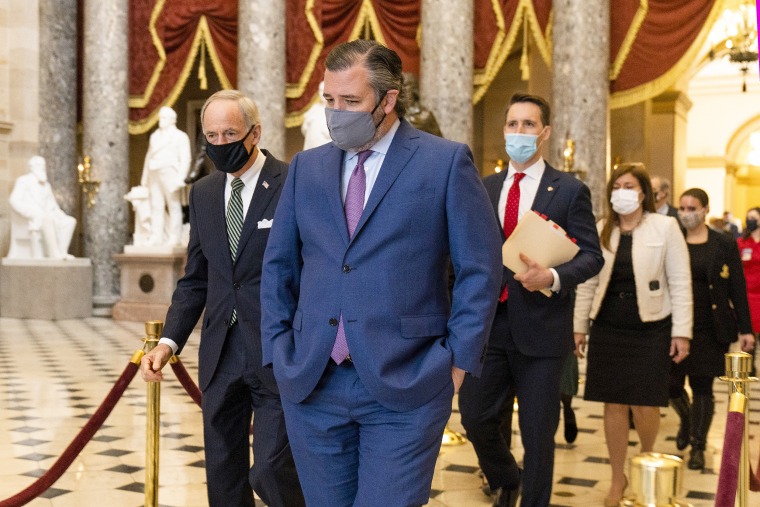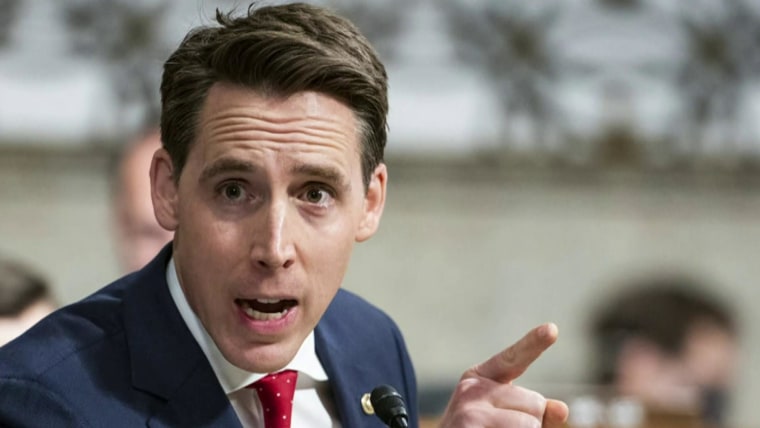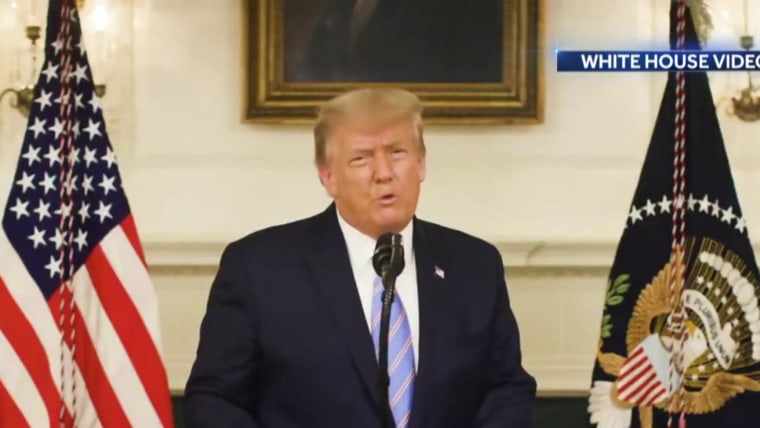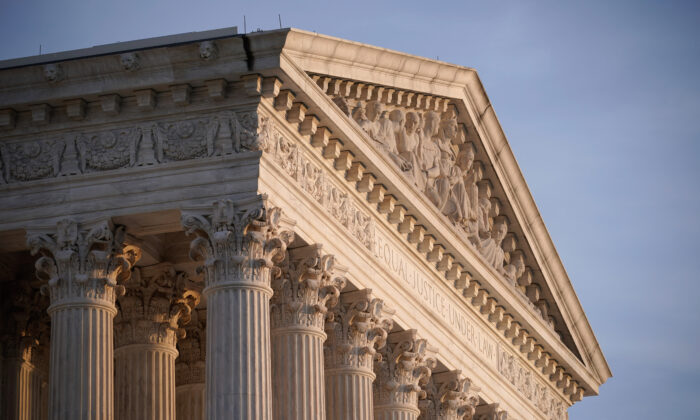Trump's voter fraud lies encouraged a riot. GOP allies are still giving them oxygen.

Sen. Ted Cruz, R-Texas, front, followed by Sen. Josh Hawley, R-Mo., walks in the Capitol ahead of a joint session of Congress to confirm Electoral College votes on Wednesday.
Manuel Balce Ceneta / APJan. 10, 2021, 3:51 PM -02By Jane C. Timm
Republicans, including Sen. Josh Hawley, have condemned violence but haven't backed down from baseless claims of fraud and irregularities.
After a mob stormed the Capitol based on President Donald Trump's election fraud lie, some top Republican allies have called for peace while still leveling the same baseless claims of widespread voter fraud that fanned the flames of violence.
In almost the same breath as he condemned the rioters who temporarily disrupted Congress' normal process of affirming President-elect Joe Biden's win, Sen. Josh Hawley of Missouri, the first Republican to announce his intention to object to the certification, suggested that Biden's victory was illegitimate.
“We do need an investigation into irregularities, fraud,” Hawley said before staring directly into the camera in a video that his office would promptly upload to YouTube and saying: “We do need a way forward together. We need election security reforms.”
In a statement, Sen. Ted Cruz, R-Texas, condemned the violence, too. Still, he said, his calls for an investigation into voter fraud were the “right thing to do" before adding, “I very much wish Congress had not set aside these concerns.”

Republicans allied with Trump continue pushing baseless voter fraud claims
JAN. 11, 202103:53
Republicans have used allegations of voter fraud and irregularities to sow distrust in the American electoral system for decades, experts said, laying the groundwork for Trump's sweeping claim that widespread fraud denied him a second term and priming the party's base to believe him despite his inability to prove it. The same falsehoods, the experts said, will be used to restrict access to the ballot box in the future.
"The same lies that drove the insurrections were also being repeated on the floor of the Congress by the people trying to upend the people’s votes," said Michael Waldman, president of the Brennan Center for Justice at New York University School of Law. "And those are the same lies we’re going to hear in state capitols by people trying to restrict the vote."
Hawley and Cruz, who are widely believed to be considering running for president in 2024, have been fiercely criticized for their roles in stoking the unrest that led to the deadly clashes in the nation's capital.

Pelosi threatens impeachment if Trump does not resign
JAN. 8, 202103:51
After weeks of defending Trump's claims of a stolen election with statements of concern about widespread voter fraud that doesn't exist, they led the effort in the Senate to object to the certification of Biden's victory in the Electoral College while ignoring the facts. Since November, there had been numerous hand counts, audits, legal challenges and investigations into voter fraud that turned up nothing to support Trump's claim and the senators' justification for challenging Biden's victory. Nonetheless, Republican senators have argued that further investigation is warranted.
In an interview with NBC Dallas-Fort Worth on Thursday, Cruz said he was "debating" election integrity, which he said "has nothing to do with this criminal terrorist assault."
Hawley, responding to calls for his resignation, stood by his decision to object to the certification of the election. “I will never apologize for giving voice to the millions of Missourians and Americans who have concerns about the integrity of our elections. That’s my job, and I will keep doing it,” he said in a statement Thursday.
Before the election, Trump and his allies filed dozens of lawsuits trying to limit mail voting and to make it more difficult and challenging longstanding mail voting mechanisms, like drop boxes. Some courts protested at the lack of evidence the campaign presented. After Biden won, Trump and his allies filed at least 57 lawsuits across the county contesting the results with allegations of fraud and irregularities; 50 have been denied, dismissed or withdrawn, according to NBC News’ tally. Former Attorney General William Barr, still leading the Justice Department at the time, said no widespread fraud was evident. Republican officials in Arizona and Georgia, which Biden flipped blue, withstood enormous pressure from Trump and his allies to vouch for the integrity of the results, with some fact-checking Trump in public and private to try and counter misinformation.
"There have already been investigations conducted by election officials, by investigative journalists and by courts. There’s really nothing left to investigate," said Rick Hasen, a professor and election law expert at the University of California, Irvine. "This election was perhaps the most watched, and perhaps for that reason, the cleanest election I think we’ve seen in American political history."
'The base was completely prepared'
Trump didn't invent claims of a rigged election — he simply turned up the volume, experts said.
It was after the recount of Florida's votes in the 2000 election, which led to a court battle that ended when the Supreme Court sided with Republican George W. Bush, "that people realized things were really narrowly divided and that you could win or lose based on restricting turnout and the vote or bolstering turnout and the vote," Waldman said. "Very quickly you started to hear Republicans making increasingly insistent claims of voter fraud."
In the years since then, Republicans in state legislatures have written and passed numerous restrictive voting laws, while federal and state investigations hunted for proof of fraud. The Justice Department has investigated it; states have launched their own investigations. Advocacy groups and nonprofits were founded in the name of preventing or rooting out voter fraud.
While the suppressive effect of such laws has been well documented, there’s still no proof that there is widespread voter fraud. When fraud occurs, it is isolated and rare.
By the time Trump took office, voter fraud was a common belief among Republicans. A majority of Republicans said it was a "major problem" in August 2016, according to a Gallup survey.
"No matter how powerful his bully pulpit, he wouldn't have a fertile — he wouldn't have a willing audience if this had not been repeated so many times over the years in a more polite voice," Waldman said.
Trump's voter fraud lie began in his first days in office, when he claimed that it cost him the popular vote. He launched a commission to dig up proof, which disbanded without ever finding any.
As states sought to adapt their election plans to accommodate the pandemic in 2020, Trump alleged that the expansion of mail-in voting — a common and secure system often used by Republicans — was creating opportunities for widespread fraud. His campaign and the Republican Party filed many lawsuits seeking judicial intervention, most of which were withdrawn or dismissed for lack of evidence.
“The base was completely prepared to believe the kind of outlandish things that Trump said," Hasen said.
Even after the deadly riots Wednesday, Republican lawmakers are still advancing falsehoods about American elections.
Sen. Kelly Loeffler, the Georgia Republican who lost her runoff race Tuesday, said she couldn’t “in good conscience” object to the certification of the election results after the mob attack.
But she nonetheless cast doubt on the results: “I believe that there were last-minute changes to the November 2020 election process and serious irregularities that resulted in too many Americans losing confidence not only in the integrity of our elections but in the power of the ballot as a tool of democracy.”
Georgia has conducted multiple recounts and found no evidence of fraud. The change in Georgia’s election code was made nearly a year ago when the state agreed to standardize signature-matching policies across its many counties. That meant election workers were trained and prepared ahead of time for an election that had unprecedented use of the state’s 15-year-old mail-ballot system. Republican election officials have characterized the changes as a strengthening of the signature-match system.
Waldman said it's hard to find anything in the history of American politics comparable to the voter fraud myth, so thoroughly disproportionate is the reality of the threat to the response.
At least during McCarthyism, he joked, "there were actual communists."
None of the Republicans questioning Biden's victory have questioned the victories of down-ballot Republicans. House Republicans, particularly, won sizable gains in the general election.
A Republican member of Congress argued that if the Supreme Court had heard arguments in one of the many lawsuits challenging the election, the riots could have been prevented.
“The American people deserved a decision on the merit of numerous claims of unconstitutionality, irregularity, and fraud. It was their duty. They failed,” Rep. Brian Babin, R-Texas, said in a statement posted on social media.
Hasen countered: “The Supreme Court didn’t dismiss the case because the justices were trying to avoid deciding hard issues. The justices didn’t hear the cases because they lacked merit.”
'Deadly consequences'
At least one key Trump ally repudiated Trump's central fraud claim in the wake of Wednesday's chaos.
In the days after Biden's win, Sen. Lindsey Graham, R-S.C., who chairs the powerful Judiciary Committee, called for an investigation into claims of fraud in Pennsylvania, repeatedly expressed concerns about the integrity of the election and called up election officials in Georgia, Nevada and Arizona.
After the riot, Graham, a staunch defender and golfing partner of the president's, gave an impassioned speech on the Senate floor decrying the lack of evidence provided by Trump's legal team to support any of the claims.
"They said there's 66,000 people in Georgia under 18 voted. How many people believed that? I asked, 'Give me 10.' They didn’t have one. They said 8,000 felons in prison voted. I said, 'Give me 10.' Hadn't got one," Graham said Wednesday night. "I don't buy this. Enough's enough. We've got to end it."
Former White House communications director Alyssa Farah said Friday on MSNBC that Trump had known for months that he had lost the election and declined to be honest with his supporters, who believed him when he said it had been stolen.
"I believe that he knew he lost and that those around him did. And that's why it was very troubling for me to see the public misled," she said. "The lack of honesty with the public, you know, ended up having deadly consequences."
Election officials across the country who have been harassed and threatened since the election had warned that Trump's rhetoric would lead to real-world violence.
"Someone’s going to get shot. Someone’s going to get killed," Georgia's Republican election systems manager, Gabriel Sterling, said Dec. 1.
2020 ELECTION INTEGRITY PROJECT - emergency blog. 25 FEBRUARY 2021
Opinion: Where Do We Go to Get the Integrity of Our Vote Back?

The Supreme Court in Washington on Nov. 5, 2020. (J. Scott Applewhite/AP Photo)

The Epoch Times - Benjamin Weingarten - February 24, 2021
The Supreme Court’s refusal to grapple with 2020 presidential election lawsuits concerning patently dubious policymaking by judges in Pennsylvania is a dereliction of duty of the highest order.
Its unwillingness to grant certiorari is particularly glaring because the claims of malfeasance are so straightforward, the issues at hand are so fundamental, and the imperative to adjudicate them is so acute, given the likeliness for them to recur and influence future elections.
The cases concern who makes the election rules: state legislators, or nonlegislative officials, including judges. The Constitution would seem to indicate the former, given that it’s state legislatures tasked with determining the “The Times, Places and Manner of holding Elections for Senators and Representatives,” as well as the “Manner” by which electors are appointed.
Yet Pennsylvania, like several other states who conferred power to make the rules upon nonlegislators, believed otherwise. As Justice Clarence Thomas recounted in his dissenting opinion:
“The Pennsylvania Legislature established an unambiguous deadline for receiving mail-in ballots: 8 p.m. on Election Day. Dissatisfied, the Pennsylvania Supreme Court extended that deadline by three days. The court also ordered officials to count ballots received by the new deadline even if there was no evidence—such as a postmark—that the ballots were mailed by Election Day.”
“These cases provide us,” Thomas asserted, “with an ideal opportunity to address just what authority nonlegislative officials have to set election rules, and to do so well before the next election cycle.
“The refusal to do so,” he concluded, “is inexplicable.”
Indeed. If election rules can be altered at any time, under any circumstance, by authorities other than elected representatives—even if said rule changes are reasonable and don’t promote lawlessness—the entire election process becomes tainted. The damage to the separation of powers is a secondary but no less devastating consequence.
Since the Supreme Court dismissed cases such as the Pennsylvania ones, which screamed for adjudication, again given that they touched on the highest priority election question of who makes the rules, it’s clear that Americans have no place left to go to ensure the integrity of the vote is protected. That the high court similarly punted on other 2020 presidential election lawsuits claiming significantly more egregious violations in the content of the rules only adds insult to constitutional injury.
Consider the other institutions that have failed us.
State governments of course permitted, or at best failed to thwart, the chicanery that transpired during the election under cover of the extraordinary circumstance of the Chinese coronavirus pandemic.
Lower courts—having in the months leading up to the election often acceded to left-wing activists engaged in lawfare to permit the erosion of the integrity of the vote—allowed it to further wither by tossing out dozens of similar cases to the Pennsylvania ones on technical grounds. That is, like the Supreme Court, they refused to judge the claims on their merits.
Now Congress is poised to foist on the country legislation enshrining the very dubious emergency election rules and regulations—mass mail-in balloting, vote harvesting, weakened verification standards, acceptance of ballots days after the election, etc.—that enabled the alleged raft of fraud, illegality, and corruption that proliferated in 2020, or at a minimum created the opportunity for such mischief.
The executive branch has indicated it would support such legislation.
This is to say nothing of the complicity of the fourth estate. Corporate media has demonstrated little desire to investigate claims of improprieties regarding the presidential election, and Big Tech has actively censored anything that would challenge the official narrative about the election—censorship to which the author has himself been subjected.
The Capitol riot has served to further obscure attention from the legitimacy of the 2020 election and make reasonable questions about it verboten.
That political institutions provided no recourse—and, in some cases, clearly violated their duties—is a betrayal of the system from which they derive power. Republican government relies on the consent of the governed, who provide it through their votes. The legitimacy of those votes undergirds the legitimacy of the entire constitutional order. Once the vote is seen as illegitimate, and every venue is seen as hostile to if not reflexively dismissive of questions about it, the entire system loses its legitimacy.
This is why Thomas was right when he concluded in his dissenting opinion that: “The decision to leave election law hidden beneath a shroud of doubt is baffling. By doing nothing, we invite further confusion and erosion of voter confidence. Our fellow citizens deserve better and expect more of us.”
To the extent that pending legislation in Congress does pass, and America finds itself further unmoored from a system in which election rules are set well in advance by our representatives—in which we vote in person, having verified our identity, on a single Election Day—this confidence will only further wane.
The question we are left asking is, who will restore confidence in our system by defending our vote?
Ben Weingarten is a fellow of the Claremont Institute and co-host of the Edmund Burke Foundation’s “The NatCon Squad.” He is the author of “American Ingrate: Ilhan Omar and the Progressive-Islamist Takeover of the Democratic Party,” and is currently working on a book on U.S.–China policy and its transformation under the Trump administration.
Views expressed in this article are the opinions of the author and do not necessarily reflect the views of The Epoch Times.
COPYRIGHTS
Copy & Paste lenken øverst for Yandex oversettelse til Norsk.
WHO and WHAT is behind it all ? : >
The bottom line is for the people to regain their original, moral principles, which have intentionally been watered out over the past generations by our press, TV, and other media owned by the Illuminati/Bilderberger Group, corrupting our morals by making misbehaviour acceptable to our society. Only in this way shall we conquer this oncoming wave of evil.
Commentary:
Administrator
HUMAN SYNTHESIS
All articles contained in Human-Synthesis are freely available and collected from the Internet. The interpretation of the contents is left to the readers and do not necessarily represent the views of the Administrator. Disclaimer: The contents of this article are of sole responsibility of the author(s). Human-Synthesis will not be responsible for any inaccurate or incorrect statement in this article. Human-Synthesis grants permission to cross-post original Human-Synthesis articles on community internet sites as long as the text & title are not modified.
The source and the author's copyright must be displayed. For publication of Human-Synthesis articles in print or other forms including commercial internet sites. Human-Synthesis contains copyrighted material the use of which has not always been specifically authorized by the copyright owner. We are making such material available to our readers under the provisions of "fair use" in an effort to advance a better understanding of political, economic and social issues. The material on this site is distributed without profit to those who have expressed a prior interest in receiving it for research and educational purposes. If you wish to use copyrighted material for purposes other than "fair use" you must request permission from the copyright owner.